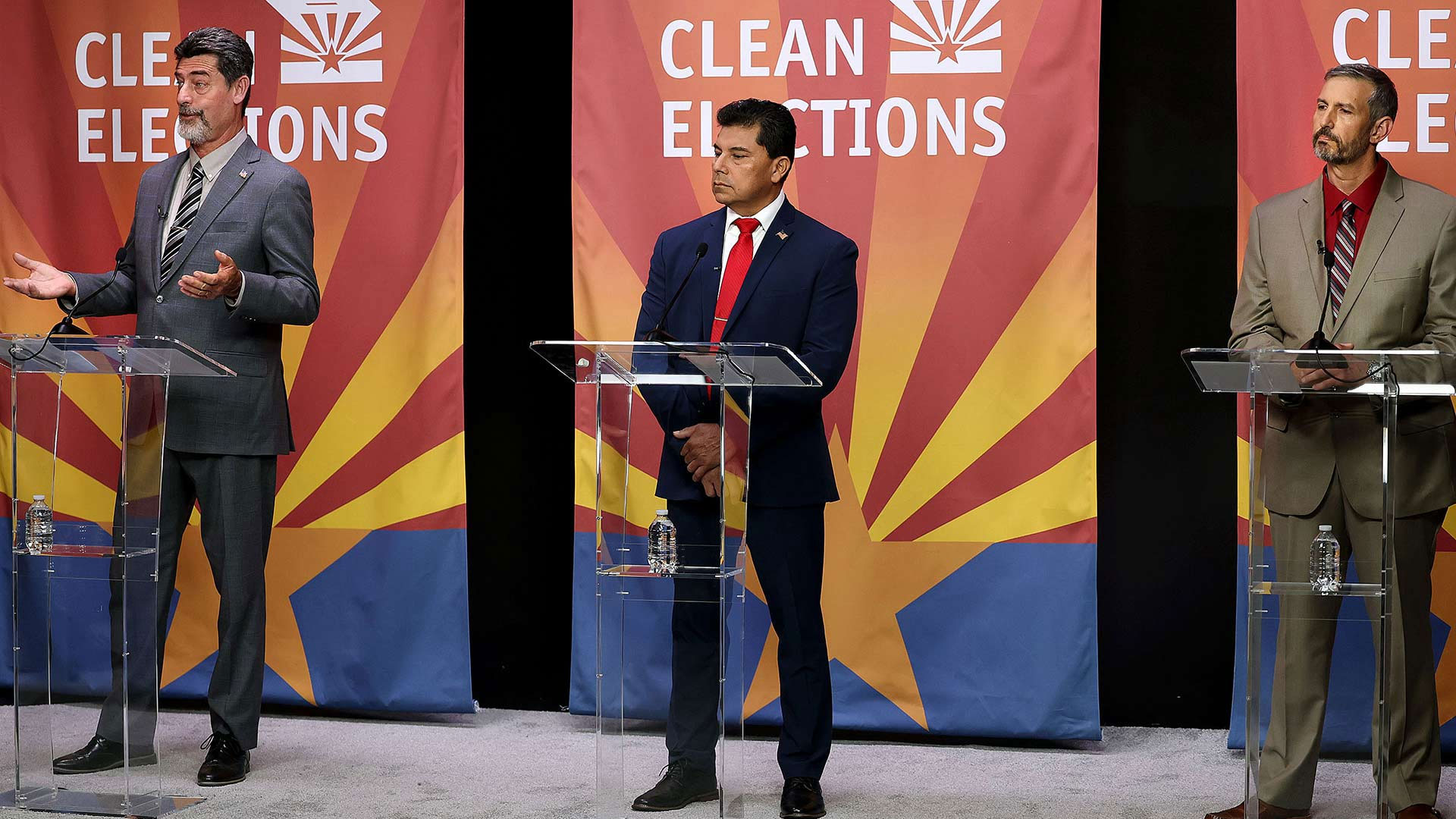 Left to right: Republican candidates for Congressional District 7 Daniel Butierez, Jorge Rivas, and Jimmy Rodriguez at the Clean Elections Debate on Monday, June 9, 2025 in Tucson, Arizona.
Left to right: Republican candidates for Congressional District 7 Daniel Butierez, Jorge Rivas, and Jimmy Rodriguez at the Clean Elections Debate on Monday, June 9, 2025 in Tucson, Arizona.
The hour-long debate, hosted by Clean Elections at AZPM, focused on immigration policy and the federal budget, and featured three candidates closely aligned with the existing priorities of the Trump Administration.
Daniel Butierez is a Tucson small business owner of Butierez Painting, and a farm property that employs people recently released from prison, according to his campaign website. He also faced the late Rep. Raúl Grijalva in the 2024 general election, receiving 37% of the vote.
Jorge Rivas owns Sammy’s Mexican Grill in Catalina, and described himself as a “proud naturalized citizen” after fleeing El Salvador as a child. He also made a previously unsuccessful bid for governor in 2022.
Jimmy Rodriguez is a political newcomer with a construction and automotive industry background.
The three candidates expressed shared satisfaction with President Donald Trump’s border policies and ICE apprehensions.
Rivas took the strongest stance against drug trafficking, suggesting a death penalty for anyone caught doing so, and said he believes President Trump would support such a policy.
“I think there should be a period of three or six months where we'd advertise, or put it in the media... I can assure you that within time, within a few months, the amount of drugs out on the street will drop dramatically, which means that we'll be saving thousands of lives,” he said.
The candidates were largely in agreement that they would support legal paths to citizenship for immigrants in limited circumstances. Rodriguez differed in suggesting temporary work visas and cautioned that Arizona’s construction and farming industries could suffer without temporary legal status.
“25% of our construction workers are undocumented, 48% are in the farm industry, and if we pulled all of those people out, it would devastate Arizona,” he said.
When it came to the housing crisis, Butierez continued a controversial idea he ran on in the 2024 election; that homeless individuals should be sent to work camps in empty prisons.
“It's a choice they make, and they choose the drugs. It's not that they choose to be homeless, it's that they're not willing to give up the drugs, and they need help with that,” he said.
Rodriguez backed away from both Rivas’ death penalty and Butierez’ work camps.
“To say that you're going to go put somebody to death for crossing the border, yeah I don’t believe in that,” he said.
When it came to federal spending, candidates were asked whether they would approve the billions of dollars in cuts to Medicaid and Medicare included in Trump’s spending package, labeled the “Big Beautiful Bill.” As many as 200,000 residents in CD7 rely on the programs for health insurance.
Butierez defended the cuts, echoing national Republicans on the issue.
“They're only cutting out the fraud and abuse,” he said
Rivas warned of excess federal spending.
“I think the President, it might sound a little rough or tough at this moment, but I think he's doing the right thing,” he said.
Rodriguez said he would support the cuts but expressed caution for those who are not able to work.
“I don't support cuts for people who genuinely need the coverage, but I do feel that able-bodied Americans, able-bodied people that are on the system now. Need to prove they're working part time, going to school, doing, doing what they need to do in order to stay qualified,” he said.
The most tense exchange of the night was over how old Rivas was when he left El Salvador and came to America. He previously said he was 17, but after the debate, Rivas said he was 16.
Rivas made a last-minute jab in his closing remarks after Butierez disagreed with Rivas’ claim that he was a child when he fled the country.
“I have never done drugs or been convicted of any crime, like my partner here to the side,” Rivas said.
Butierez spent 10 years in prison, and two years on the streets after his release, an experience that he previously told AZPM makes him especially ready to solve the housing crisis. A judge ruled the charge from 1992 void in 2020, according to court documents listed on his website.
Post-debate, Butierez called Rivas’ remark “nasty.”
“I was found not guilty. I was convicted of a crime I did not commit,” he said.
The three Republican candidates remain long shots, as Democrats outnumber Republicans two to one in the district that encompasses nearly all of the Arizona-Mexico border in Cochise County, Tucson, Yuma, and parts of western Phoenix. The Democratic candidates are Adelita Grijalva, Daniel Hernandez, Deja Foxx, Patrick Harris Sr., and José Malvido Jr.
Governor Katie Hobbs called a primary election on July 15, and the general election for September 23.
The five Democratic candidates will participate in their own debate Tuesday, June 10.

By submitting your comments, you hereby give AZPM the right to post your comments and potentially use them in any other form of media operated by this institution.